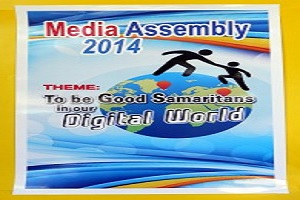PASAY CITY – Over 30 Daughters of St Paul working in the various media sectors tackled two hot issues during their annual gathering on 3-5 April 2014 at the seminar hall of the Paulines Communication Center (PCC). The theme of the gathering was “To be good Samaritans in our Digital World.”
On the first day, the participants listened to an enlightening talk on the global issue of human trafficking by Ms Cecilia Flores-Oebanda, founder of the Visayan Forum Foundation. The Visayan Forum Foundation, Inc. (VF) is a Philippine-based non-governmental organization (NGO) established in 1991, known for its innovative work for the empowerment of vulnerable migrants, especially victims of human trafficking, domestic servitude and other forms of exploitation through building social movements, advocating for policies and delivering of services.


A second talk on the Church’s response to human trafficking was given by Mrs. Maria Fenny Tatad, executive secretary of Catholic Bishops’ Conference of the Philippines (CBCP) Office on Women. This office, together with other episcopal offices, had organized a seminar-workshop entitled “Let’s Move: Knock-out Human Trafficking and Modern-Day Slavery” on Feb. 27-28, 2014 at the University of Asia and the Pacific. It aimed to increase the awareness and understanding of the public to the vulnerabilities of women and the youth to human trafficking, serving as a response to the call of the Supreme Pontiff to address cases of human trafficking and slavery in the modern times.
To bring home to the participants the reality of human trafficking, a TV movie entitled “Human Trafficking” was screened. Written by Carol Doyle and Agatha Dominik, and directed by Christian Duguay, the movie was released in USA in 2005.
On the second day, the participants listened to the echoing of the seminar on community radio held in Seoul South Korea in December 2013 by Sr. Lina Salazar, Sr. Victoria Buniel and Sr. Teresita Espina. This was followed by a report on Paulines online radio by Sr. Lina.In the afternoon, the participants met in groups to formulate practical and concrete lines of action to end modern-day slavery through various means including new media platforms, incorporating them into the province plan 2014-2019.


On the third and final day, Dr Esteban C. Godilano, a nationally and internationally-acclaimed scientist, Geospatial and Watershed Expert, Board member of the Climate Change Congress of the Philippines (CCCP) and part of the Technical Group of the Department of Agriculture, took time off to enlighten the participants on climate change, the second issue tackled by the assembly.
In his talk, he gave the Philippine context by presenting the current situation of the world. Facts and figures were quite alarming, since it mirrors the real condition of the Philippines when it comes to the impacts of climate change.


Godilano said that large countries (like America, Russia, etc.) refused to sign the Kyoto protocol and to revert from coal-based power. It is because coal-based power is actually their main source of electricity. But gases produced by this industry (slash and burn or the charcoal making industry) are the main players in climate change.
He said that greenhouse gases are anthropogenic sources of climate change. And as the years go by, its impacts would worsen up to the tipping point, which is a four degree Centigrade increase in temperature.
Climate change is causing us a lot of damage. It affects “agriculture (rice supply shortage), fresh waters, livestock, fisheries (coral breeding), tourism, human settlement, transportation and infrastructure, human health and the economy. And if these persist, national security may be compromised.

The scientist also shared some of his contributions to further understand climate change – his landslide maps, drought maps, flooding maps, and the recent climate change impact map. In his map, he combined the different themes of climate change such as “rainfall, rainy days, typhoon, temperature, flooding, humidity, cloudiness, growing periods, ground water potential, and biophysical and edaphic factors.” He also had this disaster formula, with elements such as “rainfall, land cover, soil texture, slope gradient, erosion severity.” He even predicted the coming of Sendong, Ondoy and Yolanda but like the proverbial prophets of old, “Nobody listened,” he said.
According to Godilano, the UN has said that “the country laws on climate change and disaster risk management are the best in the world.” The Philippines, with 21 environmental laws (some are Climate Change Act or RA 9729, RA 10121 or Disaster Risk Reduction and Management 2010, Clean Air Act, etc.), the finest in the world, are still vulnerable with the effects of climate change. Why? Because, he stressed, we lack the political will to “walk the talk.”
He said that climate change is the “new normal.” We can no longer eradicate totally this phenomenon that we have created. What we could do is to have adaptation and mitigation plans. Some of his suggestions are the following:
- The need for public access to maps
- Making watersheds as the planning domain
- Relocation for those who are extremely affected both by poverty and climate change impacts
- Database for strategic planning
- Change in pattern of planting crops
- The need to change consumption habit
- Climate change adaptation and mitigation program (CCAMP) Debt Swap to Geographic and Strategic Adaption and Mitigation Program (G-STAMP).
He encouraged the participant-communicators to intervene. People could be involved by making them informed of what really is happening to their haven. With information comes empowerment. But with science alone, this information would be of no use if not properly disseminated. The challenge now is how to make the people care, how to make this complex, technical matter be relevant to laymen’s lives.
Like the lines of action for human trafficking and cybersex, the lines of action for climax change would also be incorporated into the province plan.
Later in the afternoon, the participants had a workshop on the 48th World Communications Day Message themedCommunications at the service of an authentic culture of encounter on how to present it to different sectors of society. They also brainstormed on the programming of the online radio.
By: Sr. Anna Yap, FSP

